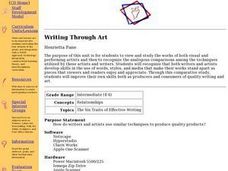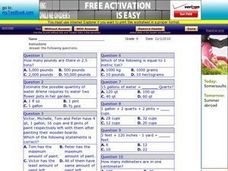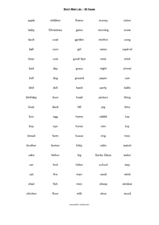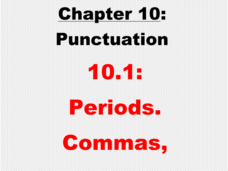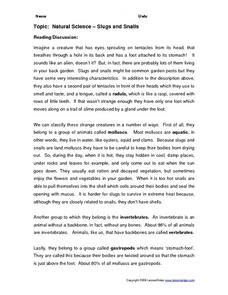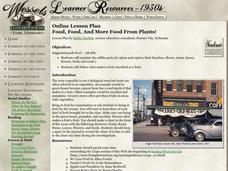Curated OER
Tissue Paper Puzzle Art
Get creative and use a tissue paper collage to make wonderful window hangings for the classroom. You'll find the materials list, objectives, and instructions needed to complete this fun activity. This project encourages eye-hand...
Curated OER
Writing Through Art
Examine the works of visual and performing artists with upper graders. Using the works, they identify the comparisons among the techniques used. They will also review the six traits of effective writing and keep a writing journal...
Curated OER
My Test Book: Units of Measurement
In this math skills learning exercise, 5th graders solve 10 multiple choice math problems regarding units of measurement. Students may view the correct answers.
Curated OER
Shintoism
Take a trip to Japan in this bright and vivid presentation that displays the philosophies and traditions of Shintoism. Pictures of temples, shrines, and theater productions will enthrall your class and bring their study of world...
Curated OER
95 Nouns
A list of 95 nouns provides a great example to define nouns for your class. They can keep this at their desks for reference. Also, you can cut the list into strips to keep in a "noun jar," or have kids circle their favorite ones! This...
Curated OER
Summer Breeze
Introduce a lesson on wind with this short poem titled, "Summer Breeze." After reading the poem, ask your class why wind is important for our environment. What a great resource for a lesson hook!
Curated OER
Cause and Effect Worksheet 2
Why does Scout fear Boo? Why does George kill Lennie? Whether in literature or life, helping young learners recognize the relationship between actions and consequences is an important lesson. Have your class match twelve observable...
Curated OER
Add and Subtract within 100
Practice problem solving with 10 word problems. Learners are encouraged to draw to solve each of these simple addition and subtraction word problems. Note: There are typos and some of the problems are awkwardly worded.
Curated OER
Generate Measurement Data Word Problems
Plot data for three word problems, each with a table of data. Learners create line plots for these, all of which have only single-digit whole numbers. The large text and few number of problems make this ideal as a whole-class warm up....
Curated OER
Know your roots!
Looking at an image of plant systems with their roots in the ground, learners determine which would be the most or least difficult to pull. They write short sentences describing which plant they chose and why. Intended for 3rd or 4th...
Curated OER
Punctuation: Periods. Commas,
Color-coded slides model for viewers the various uses of the comma and the period. The rule is presented and followed by several examples. Consider extending the lesson with a practice exercise.
Curated OER
Plants And Pollination
Students describe sexual reproduction in plants, including the process of pollination, how insects assist in pollination, and how pollination differs from fertilization. They also explore the importance of honey bees to Arizona agriculture.
Curated OER
Insects Are Helpful!
Students see that insects do lots good and are very valuable to humans and nature. This is part of an ongoing effort to dispel fears of insects. They rotate through a series of centers that have examples of how insects contribute to our...
Curated OER
Relating Addition and Subtraction
In this number sentence activity, 3rd graders write a related addition or subtraction sentence for 13 math problems. Students answer 2 word problems and 2 multiple choice answer math problems relating to number sentences.
Curated OER
Practice Dividing By 3 or 4
In this division worksheet, students read 5 story problems in which basic division facts are used. Students write the division sentence and solve.
Curated OER
The Great Pollinators
Students discover the reproductive parts of a plant. In this biology instructional activity, students identify and categorize several different plants they dissect in class. Students record their information using a data chart.
Curated OER
A Hidden Beauty
Expose the beautiful mystery of bulbs as young botanists learn all about these fascinating plants. They glean information from a short text before observing actual bulbs (consider an onion), and comparing their findings with predictions....
Curated OER
Creepy, Crawly Critters
Students study characteristics of insects by creating models from an assortment of materials. They create rubrics showing what an insect must have and create an insect, using a bag of materials. They cut out the puzzle insects included...
Curated OER
Slugs and Snails
Slugs and snails are the focus of this life science learning exercise. Student read a selection on these animals, then answer ten comprehension questions. Then, students must draw an "alien portrait" using the characteristics of slugs...
Curated OER
What's Your Genus? Scientific Classification and the VT
Students learn about binomial nomenclature, the scientific system of classification. In this scientific classification lesson, students work cooperatively to complete a binomial scavenger hunt using the internet and a Visual Thesaurus....
Curated OER
What's Your Genus? Scientific Classification and the VT
Students understand the definition of binomial nomenclature. In this binomial nomenclature lesson, students classify ordinary animals by seeking their scientific names. Students participate in a knowledge hunt using binomial nomenclature.
Curated OER
Seed Types
Students dissect seeds. In this seed dissection lesson, students discover the anatomy of seeds. After dissecting seeds, students hypothesize and design the perfect seed to survive in a dry forest.
Curated OER
PLANT LIFE CYCLES
Student learns about the life cycle of plants by watching a time-lapse video. This activity provides students with further evidence that all living things grow and change as they progress through their life cycle. Student conducts a...
Curated OER
Food, Food, And More Food From Plants!
Learners examine the edible parts of a plant and explore their function. They define what makes a fruit classified as a fruit. They create a sketch or map or photo of a 1930s farm and justify their plant selections.



